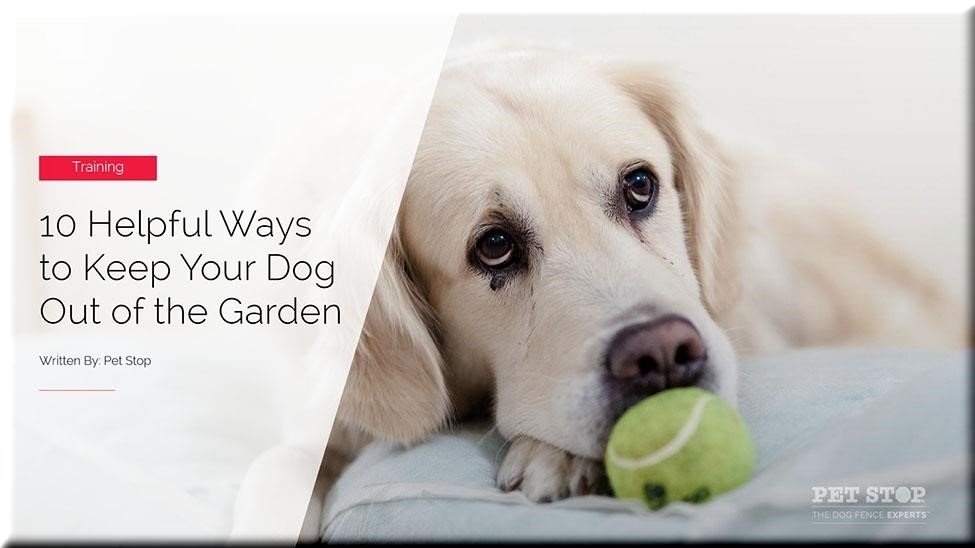Garden
Keeping Your Dog Out of the Garden: Effective Dog-Proofing Techniques
Sharing your garden with a dog can be a rewarding experience, but it can also present challenges. If you’re finding your furry friend has a penchant for digging, chewing, or just generally disrupting your carefully cultivated plants, you’re not alone. This article will guide you through the best ways to keep your dog out of the garden, ensuring a harmonious coexistence for both you and your canine companion.
Effective Dog-Proofing Techniques for Your Garden
The key to keeping your dog out of the garden lies in understanding your dog’s behavior and implementing a multi-faceted approach. You’ll need to combine physical barriers, scent deterrents, and training techniques to create a dog-proof zone that respects both your garden and your dog’s needs.
Understanding Your Dog’s Behavior
Before diving into specific techniques, it’s crucial to understand why your dog might be drawn to the garden in the first place. Is it the irresistible smell of freshly tilled soil, the tantalizing sight of colorful flowers, or just plain curiosity? Consider your dog’s breed characteristics as well. Some breeds, like terriers or huskies, are known for their digging instincts. Assessing your dog’s training level will also help you determine the best approach. A well-trained dog might respond to simple commands, while a puppy may require more patience and consistent training.
Physical Barriers
Physical barriers are often the first line of defense against a curious canine.
Fencing
Fencing is a classic solution for keeping dogs out of gardens. Choose a fence material that is durable, suitable for your dog’s size and energy level, and matches your aesthetic preferences. Consider a fence height of at least 4 feet for medium to large dogs. Wooden fences offer a classic look, while metal fences are generally more durable.
Thorny Barriers
Thorny barriers, such as rose bushes, cacti, or even chicken wire, can be a deterring factor, especially for dogs with sensitive noses and paws. These natural deterrents provide an extra layer of protection, making it less appealing for your dog to venture into the garden.
Natural Barriers
Planting dense hedges or shrubs around your garden can create a visual barrier, discouraging your dog from entering. Raised beds, elevated above ground level, can also help keep dogs out of reach of valuable plants.
Scent Deterrents
Dogs have an incredibly sensitive sense of smell, which can be used to your advantage when it comes to deterring them from your garden.
Spicy Options
Spicy scents, like mustard powder or chili flakes, are often disliked by dogs. Sprinkling these ingredients around the perimeter of your garden can create an olfactory barrier, making it less appealing for your dog to enter.
Ammoniacal Solutions
Dogs tend to dislike the smell of vinegar and ammonia. Soak coffee filters in these solutions and place them around your garden to deter your furry friend.
Commercial Repellents
Several commercial repellents specifically designed for dogs are available on the market. These repellents often contain a mix of scents, such as citrus, garlic, or peppermint, that are unpleasant to dogs. Always check the label to ensure the repellent is safe for your pets and plants.
Water Sprinklers
Water, especially from a sudden and unexpected source, can be a great deterrent for dogs.
Motion-Activated Sprinklers
Motion-activated sprinklers are a modern solution for keeping dogs at bay. These sprinklers sense movement and automatically spray water, surprising your dog and discouraging further exploration.
Water as a Deterring Element
Dogs generally don’t enjoy getting wet, especially if they’re caught off guard. Place sprinklers strategically around your garden to create a "wet zone" that your dog will avoid.
Training and Management
Training and management techniques play a vital role in ensuring your dog respects your garden boundaries.
Establish "No-Go Zones"
Teach your dog a clear command like "No!" or "Leave it!" and use it consistently when your dog approaches the garden. Positive reinforcement is crucial, so reward your dog for good behavior with treats or praise.
Create Designated Play Areas
Provide your dog with a dedicated play area away from the garden. This will create a positive association with the area and encourage them to play there instead of in your garden.
Reward Good Behavior
Reward your dog for staying out of the garden with positive reinforcement, such as treats, praise, or a favorite toy. Consistency is key to success!
Container Gardening
Container gardening can be a fantastic option for dog owners who want to enjoy gardening without the risk of canine destruction.
Advantages of Container Gardening
Container gardening offers several advantages. It gives you control over the soil and watering, making it easier to manage plants. Containers are also easier to move, allowing you to create different garden layouts or bring your plants indoors during colder weather.
Choosing the Right Containers
Choose containers that are large enough to accommodate your plants’ root systems. Material options include ceramic, plastic, or metal. Ensure the containers are durable enough to withstand your dog’s potential curiosity.
Placement and Access
Place containers in elevated areas or use barriers to make it difficult for your dog to reach them. Consider using small, decorative fences or chicken wire to create a barrier around the containers.
Additional Tips to Keep Dogs Out of Gardens
Even with a robust strategy in place, you can still implement some additional tips to keep your dog from getting into the garden.
The Power of Distractions
Dogs are easily distracted, and providing engaging toys can help keep them occupied. Offer chew toys, fetch toys, or puzzle toys to redirect their attention away from the garden. Supervise your dog’s play to minimize access to the garden during playtime.
Safeguarding Vulnerable Plants
Not all plants are safe for dogs. Research toxic plants and identify those that need extra protection. Plants like azaleas, lilies, and tulips can be harmful to dogs. Use netting or covers to protect vulnerable plants from digging or chewing.
Ongoing Management and Adaptation
Remember, every dog is different. Monitoring your dog’s behavior and adjusting your approach as needed is essential. Be patient and consistent with your training. Celebrate your dog’s successes and recognize their efforts to stay out of the garden.
FAQ: Keeping Your Dog Out of the Garden
What if my dog is a digger?
If your dog has a strong digging instinct, consider using a sturdy fence, reinforcing the base with concrete, or creating designated digging zones away from your garden.
Is there a way to make my garden smell bad to my dog?
Yes, you can use strong scents like vinegar, ammonia, or citrus peels. However, some dogs actually enjoy these smells, so it’s important to test them cautiously on your dog before using them extensively in your garden.
What if I don’t have a lot of space for a separate play area?
You can still create a designated play area even in a small space. Use containers or raised beds, keep toys in your garden, and create a small fenced-off area for your dog to play in.
Will my dog ever fully understand that the garden is off-limits?
It depends on your dog’s breed, training level, and personality. With consistent training and positive reinforcement, most dogs can learn to avoid the garden.
What if my dog is persistent and jumps over fences?
Consider a higher fence, add additional deterrents like thorny barriers, or look into invisible fences that use an underground wire and a collar to create boundaries.
Conclusion
Keeping your dog out of the garden might seem like a constant battle, but with a well-thought-out plan and a touch of patience, you can create a dog-proof haven for your plants while still ensuring your dog enjoys a safe and happy space. Remember, communication, training, and providing your dog with alternatives are all vital components of creating a harmonious garden for all.
Let us know what strategies work best for you and your furry friend in the comments below. Share your experiences and insights so other gardeners can benefit from your success!



Leave a Reply